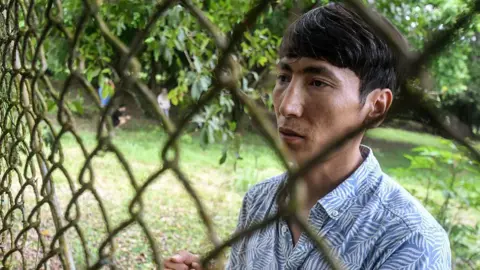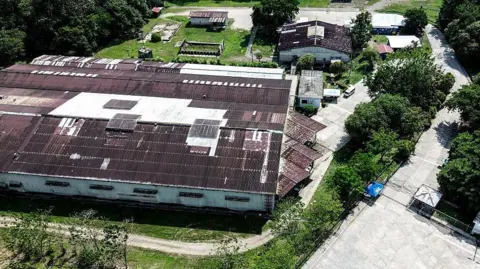Costa Rican court orders release of migrants deported from US
 EZEQUIEL BECERRA/AFP via Getty Images
EZEQUIEL BECERRA/AFP via Getty ImagesA court in Costa Rica has ordered the release of 200 migrants deported from the US.
Rights groups say the group - from countries including Afghanistan, China, Ghana, India and Vietnam - had been taken to a shelter they were not allowed to leave unsupervised.
Immigration officials have been given two weeks to determine the migrants' status and release them from the shelter where some are still being housed.
They were sent to Costa Rica after its government agreed to receive migrants deported to countries other than their homeland.
The deportees, among them more than 80 children, arrived on flights from the US shortly after the deal between the two governments was struck in February.
All 200 had been screened by US authorities and found to have "no links to terrorist groups", Costa Rican migration authorities said.
They were taken to the Temporary Migrant Care Centre (Catem), 360km (220 miles) south of the capital, San José.
A report by rights organisations said they were held there "arbitrarily and illegally for more than 60 days" without access to legal counsel or information in their respective languages.
 Photo by ARMANDO ACEVEDO/AFP via Getty Images
Photo by ARMANDO ACEVEDO/AFP via Getty ImagesIn the face of mounting criticism, Costa Rican migration authorities granted the deportees temporary special status in April, allowing them to move freely outside the shelter where they were being held.
In Tuesday's ruling, four out of the seven judges said that the conditions under which the deportees were held had violated their rights.
Among the failures recorded by the court were the fact that they had been deprived of their freedom of movement without a prior individual ruling, that their communications with the outside had been restricted, and that they had not been told about the possibility of applying for refugee status.
Since they were expelled from the US, some of the 200 deportees have been voluntarily repatriated to their homelands but 28 remain at Catem, according to official figures.
Under the ruling, Costa Rican migration authorities have been given two weeks to define the migration status of each of the remaining deportees as well as determine what type of state assistance they may require.
The court did determine, however, that the government had acted within its rights when it struck the deal with the Trump administration to accept deported migrants from third countries.
Costa Rica was the third nation in Central America to strike such a deal with the Trump administration after Panama and El Salvador.
The deportation of migrants to countries other than their homeland has been challenged in the US as well as in Costa Rica.
However, the US Supreme Court reversed a lower court order on Monday that required that migrants be given the chance to challenge the deportations because they could be at risk of torture, persecution or death in the country they were deported to.
